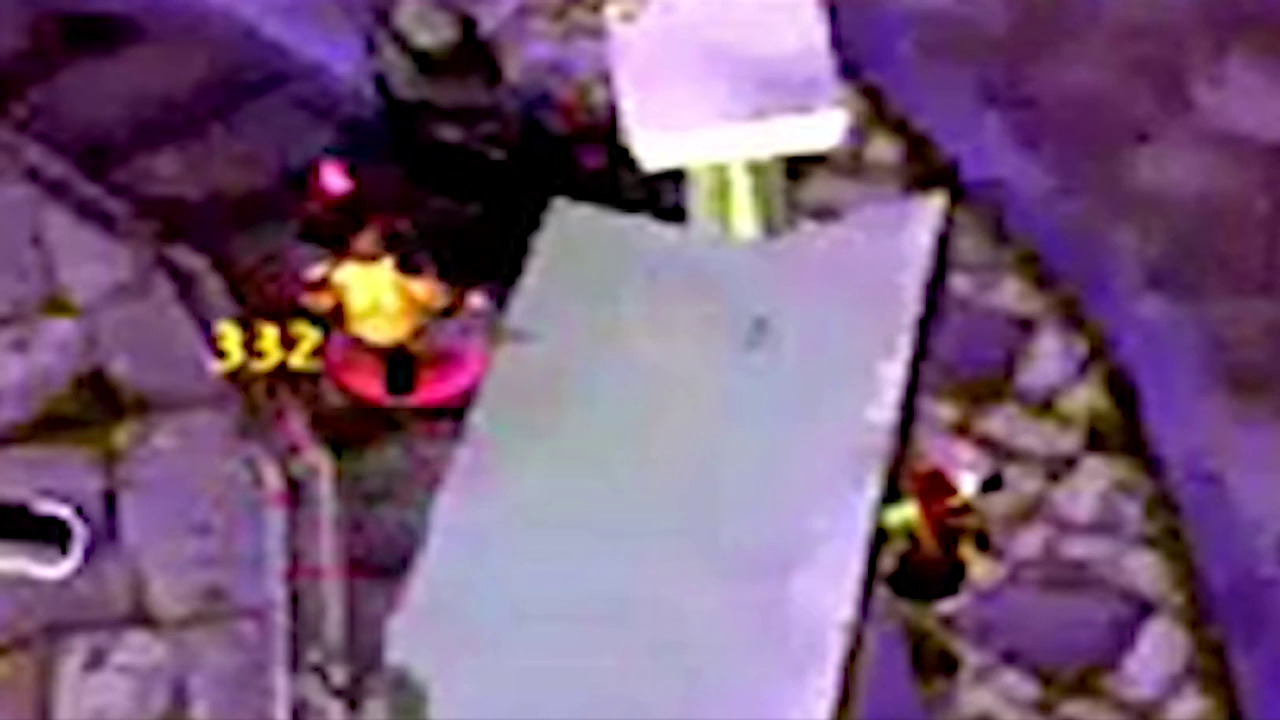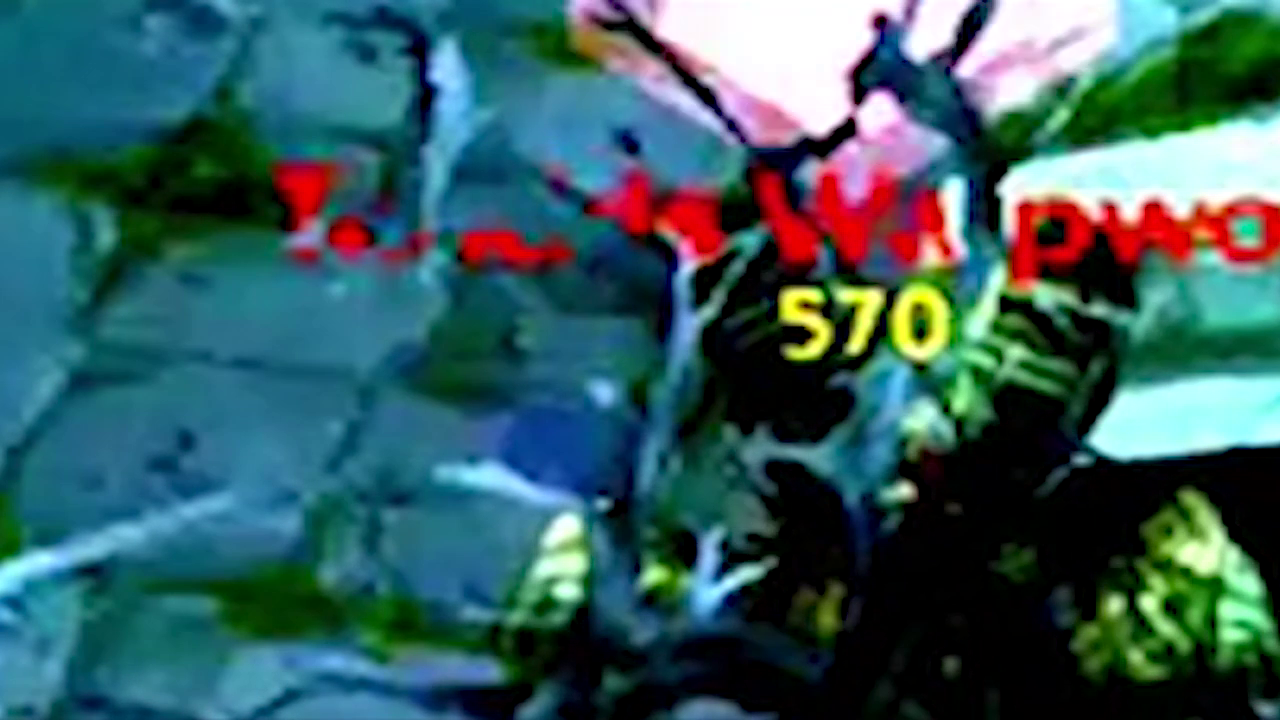CHINESE GOLD (BOOM)
Digital video (1280 x 720), color, sound, 09’48”, 2007, Switzerland, Austria, United States
Created by UBERMORGEN (copyleft 2007)
Approximately fifteen years ago, UBERMONGEN introduced Chinese Gold, a sui generis investigation of the gold farming phenomenon, that is, the practice of playing a massively multiplayer online game with the specific aim of acquiring in-game currency and later selling it for real-world money. An ambitious mixed (hyper)media project featuring texts, machinima, and re-appropriated prints, Chinese Gold brought to the surface the highly exploitative nature of video game playing. Thousands of Chinese players worked nonstop in the digital equivalent of sweatshops to generate virtual currency, digital items, and even full characters for Western, mostly North American and European, players. This lo-res found footage video, originally uploaded on Google and appropriated by the artists, showcases a teleportation hack in World of Warcraft, repeated over and over by Chinese gold farmers. Interestingly, this emergent practice was exploited, among others, by a company managed by Steve K. Bannon, an American media executive, political strategist, and former investment banker, who served as the White House’s chief strategist in the administration of U.S. President Donald Trump. Bannon was just one of several American intermediaries who set up companies that hired these digital workers. UBERMORGEN’s prophetic examination of gold-farming highlights the complex interplay between gaming and politics, ideology and capitalism. In the age of gamified economies, trade wars, pandemics, conspiracy theories, pervasive trolling, and armed insurrections, Chinese Gold speaks of the current moment.
UBERMORGEN is an artist duo founded in 1995. Actionist autist lizvlx and pragmatic visionary Hans Bernhard are net.art pioneers and media hackers widely recognized for their high-risk research into data & matter, conceptual art, haute couture websites and polarizing social experiments. CNN called them 'Maverick Austrian Business People' during their Vote-Auction online project. They reached a global audience of 500 million while challenging the FBI, CIA, and NSA during the US presidential election. In 2005, they launched their acclaimed EKMRZ Trilogy, a series of conceptual hacks – Google Will Eat Itself, Amazon Noir, and The Sound of eBay. UBERMORGEN controls 175 domains. Their exhibitions include Liverpool Biennial; Whitney Museum (2020); New Museum, New York; Somerset House, London; Haifa Museum of Art, Israel/Palestine (2019); Wei-Ling Contemporary Malaysia; HKW, Berlin; ZKM; National Art Gallery, Sofia (2017); ICA Miami; Mahatma Gandhi Institute, Mauritius (2015); Serpentine Galleries, London (2014); Kunsthal Aarhus; Ars Electronica, Austria; MoMA Ljubljana; ArtScience Museum, Singapore (2013); 3331 Arts Chiyoda, Japan (2012); Centre Pompidou; Gwangju Design Biennale; WRO Media Art Biennale (2011); Prague Biennale (2009); Biennale of Sydney (2008); MOCA Taipei (2007); The Premises, Johannesburg; ICC Tokyo (2005); SFMOMA, USA (2001).
Matteo Bittanti: Under certain conditions, an attentive observer can spot emerging social, cultural, and technological phenomena within the gaming subculture that eventually reach the mainstream. As ethnographer T.L. Taylor once put it, “video games are the proverbial canary in the coal mine.” Your project is, in many ways, extraordinarily prescient. Although on the surface it may appear as a partially fictional, but nonetheless illuminating investigation of the so-called Chinese ‘gold farming’ practice – wherein laborers play video games such as World of Warcraft nonstop to gain in-game currency, equipment, and leveled-up characters, which are then sold to American and European gamers on eBay or other platforms – the key theme that you addressed with Chinese Gold was the growing tension between superpowers. Specifically, you intercepted the evolving nature of trade between the West and the East, the dialectic between exploiters and the exploited, work and pleasure, technology and society, bringing countless paradoxes to the foreground. The consequences of gold farming have acquired a novel degree of legibility in the first decade of the 21 century. Consider, for example, the role played by one of the key nodes in the far-right populist network Steve K. Bannon. In Devil’s Bargain: Steve Bannon, Donald Trump, and the Storming of the Presidency (2017), author Joshua Green writes how Bannon,
made another decision that wasn’t immediately obvious but that would have a significant effect on the size and nature of Breitbart’s audience – and eventually on the 2016 presidential campaign. He wanted to attract the online legions of mostly young men he’d run up against several years earlier, believing that the Internet masses could be harnessed to stoke a political revolution. Back in 2007, when he’d taken over Internet Gaming Entertainment, the Hong Kong company that systemized gold farming in World of Warcraft and other massively multiplayer online games, Bannon had become fascinated by the size and agency of the audiences congregating on MMO message boards such as Wowhead, Allakhazam, and (his favorite) Thottbot. “In 2006, 2007, they were doing 1.5 billion page views a month,” he recalled. “Just insane traffic. I thought we could monetize it, but it turned out I couldn’t give the advertising away.” Instead, the gamers ended up wrecking IGE’s business model by organizing themselves on the message boards and forcing the companies behind World of Warcraft and other MMO games to curb the disruptive practice of gold farming. IGE’s investors lost millions of dollars. But Bannon gained a perverse appreciation for the gamers who’d done him in. “These guys, these rootless white males, had monster power,” he said. “It was the pre-Reddit. It’s the same guys on Thottbot who were [later] on Reddit” and 4chan – the message boards that became the birthplace of the alt-right. When Bannon took over Breitbart, he wanted to capture this audience. Andrew Breitbart had drawn a portion of it enchanted by his aggressive provocations on issues such as race and political correctness. Bannon took it further. He envisioned a great fusion between the masses of alienated gamers, so powerful in the online world, and the right-wing outsiders are drawn to Breitbart by its radical politics and fuck-you attitude. “The reality is, Fox News’ audience was geriatric and no one was connecting with this younger group,” Bannon said. But he needed a way to connect. He found it in Milo Yiannopoulos, a gay British tech blogger and Internet troll nonpareil. Hoping to appeal to the gamer audience, Bannon found Yiannopoulos through a friend while scouting for someone to launch a Breitbart tech vertical. “He sent me a résumé and the title of the book he was working on: The Pathological Narcissism of the Silicon Valley Elite,” Bannon recalled. “I said, ‘Whoa.’ Then I met him. When I saw Milo, it was the first time I saw a guy who could connect culturally like an Andrew Breitbart. He had the fearlessness, the brains, the charisma – it’s something special about those guys. They just had that ‘it’ factor. The difference was, Andrew had a very strong moral universe, and Milo is an amoral nihilist. I knew right away, he’s gonna be a fucking meteor.” At its essence, the alt-right is a rolling tumbleweed of wounded male id and aggression. (Joshua Green)
Irony aside – the same person presenting himself as the paladin of a nationalistic ideology condemning the so-called globalists invested heavily in a company that outsourced gaming labor to the Chinese, thus fully embracing the same exploitative behaviors he was condemning – what’s remarkable in this passage is Bannon’s ability to recognize the gamer subculture as an untapped resource for resentment, frustration, and rage, one that could be easily hijacked and exploited for a specific political agenda. I know that you are waiting for a question, so here it comes. The Chinese gold farming debacle was then followed, in rapid succession, by Gamergate, the mainstreaming of the Alt-Right, Pizzagate, “The Donald”, The 2016 US Presidential Elections, QAnon, the Storming of the Capitol and the full transformation of the G.O.P. into the Party of Trolls. Why are video games such a powerful magnet for an entire category of people obsessed by the perceived decline of white masculinity?
UBERMORGEN: First, we would like to thank you for the longest question ever received in an interview. Brilliant! Most of what we can say is already in the question. And this is not absurd, this is logical, the curator is the artist, the interviewer is the interviewee. But, basically what is left for us to answer is a reference to the ‘Binary Primitivism’ project, which manifests itself here: and is one of the explicit results of six years research into IT/Silicon Valley supremacy, Alt-right, Incels, Anti-feminism, Trolling, Right-Wing Militias, Neo-Nazis, Querfront, and Conspiracy Myths.
And the project Chinese Gold you are referring to, is a very old project (2005) and probably needs to be seen in a historical context rather than a contemporary one. The toxicity of the combination between blockbuster video game releases, the studios behind these releases, and the connected communities is pretty obvious, it is a cesspool of puberty/post-puberty white male idiocracy and ‘rebellion’ let loose without any guidance or state regulation within the most unregulated ecosystems on Earth, the internet, social media, forums, crypto libertarian blockchains/currencies & gaming platforms. Today all these aspects bleed together and create a universal compound of anger, fear, frustration, and evil.
Video games have become one of the most dominant forms of entertainment in a world where we are seemingly dealing with topics of discrimination, sexism, racism, gender, and violence against any perceived form of difference from the hetero-normative white male entitled and privileged position. The fear is understandable, the aggression is logical and the consequences are dire. There is no way to change this, if we don’t adapt to the current realities. How to deal with contradictions, violence, and a clearly empowered global but fragmented right-wing based on authoritarian, totalitarian, non-inclusivity, we have no clue. There is no answer.
Matteo Bittanti: A more recent example of the convergence between gaming, politics, and the market is the GameStop saga, which has been framed as a David-vs-Goliath saga by the mainstream media — but also by several “Substack expats” for that matter — in which the so-called masses, i.e. the “idealistic individual investors” congregating on Wallstreetbets, took their revenge on a bunch of “arrogant hedge funds”. On The Guardian, Morovoz described the phenomenon as a perfect example of “platform populism”, which has “no coherent political ideology of its own”. In the accompanying text for Chinese Gold Farming you wrote: “What lies ahead for the Warcraft economy? Let’s keep watching it in the future.” Do you see any affinities between the gold farming phenomenon and the GameStop affair? In other words, is the “future” that you premediated, to use Richard Grusin’s term, our present?
UBERMORGEN: The future does not exist, except today. Our idea of the future is generated by the situation we are in, by the knowledge we have, by the aesthetics and methods we use. It is impossible for the future to be in the now, since it does not exist. But what we can do is imagine and search for invisible ‘things’ that then could influence the now, which would then influence the time after or parallel or somewhere else to the now. The machines and networks have helped us distort and destroy the dogmatic concepts of time and space and therefore we can rearrange our perception of incidents. History does not exist as the future does not exist. Things are happening in the now and for now, we can say that Chinese Gold Farming and GameStop are just two stimulants for our artistic thinking and acting. What an interesting phenomenon to be watching unfold in real-time; and what great, great narratives!
Matteo Bittanti: In the “metadata” of Chinese Gold, I stumbled upon a sentence that stuck into my head: “close Internet cafés in Beijing to prevent the spread of SARS”. Aside from the facile metaphor that virality has become the quintessential form of communication in the digital age — not to mention the interesting research done within World of Warcraft back in the day about the dynamics of contagion* —, Chinese Gold feels very “now”: fresh, actual, current, even urgent. So, what happens in a world where internet cafes have been closed to prevent the spread of Covid-19 globally, but everybody is always already online?
* I’m sure you are aware that, in 2007, researchers investigated the spread of a deadly virus within World of Warcraft and, retrospectively, realized that it bears a striking resemblance to Covid-19.
UBERMORGEN: Chinese Gold feels fresh because it is based on a greater narrative rather than facts or opinions or judgments. The fantastic aspect is that new technology is using old methods (i.e., the sweatshop), so the economical reality stays pretty much the same, just the medium and the skill-sets change. I think we will encounter many seemingly radically new developments that are based on ideas and economical concepts from a long-forgotten time. Let’s be very clear, our societies have been using network concepts and metaphors for over 250 years and our thinking influences the actual building of infrastructure, while the infrastructure strongly influences the way we perceive the world and the way we live and navigate our so-called reality.
Matteo Bittanti: One does not need to read between the lines of Chinese Gold’s accompanying text – “There is a balance, which in the real world, the Treasury, and the Federal Reserve, and International Organizations try to maintain” – to realize that the so-called economy is a rigged game that has little to do with lived reality. The biggest winners on Wall Street are parasites that do not produce anything of value: their entire existence is spent on “getting as much cheap shit for themselves as possible without throwing the system completely out of whack” hence their displeasure that the gamers on Reddit are now playing the same game. Is gaming – especially, gaming the system – the most appropriate metaphor to describe neoliberal marketplaces? The gamification of the financial sector and the stock market is, therefore, the most significant form of “play” in the 21st century?
UBERMORGEN: Gamification vs Play is the name of a symposium we are currently planning for July 2021 in collaboration with the Academy of the Arts of the World in Cologne, and the Black Mirror Institute, and the Research Group Networks from the Academy of Media Arts Cologne, the university where UBERMORGEN are professors for Networks within the art department. We are looking into the gamification of labor, for example, the gig economy in Kenya, Colombia, and Cuba, but we are also interested in the professionalization of playing (or more and more streaming) actual competitive (entertainment) games. As you correctly reference, the financial sector has been a gamified area for decades where the most brilliant math and physics prodigies went to develop the most perverse algorithms and systems to prevent regulation and to play on an abstraction level that only a handful of humans can understand and only machines are able to execute. Today we are way beyond that and it is overwhelming. Trying to understand the level of gamification today would mean to challenge the current concept of reality. If games, work and life, and perception of what is real merge and emulsify, then we can say that we do live in some sort of matrix situation, we play high-end entertainment within networks on our huge 4K screens, consume drugs while doing so, order-in food (gig economy gamified), and to relax we listen to curated Spotify lists/streams while constantly playing social media (dopamine kicks) and watching Pixar high-end entertainment. Some of us live in the most extreme tech/reality bubbles where time and space most definitely are dissolved and our lives can be seen and perceived as a highly immersive game and experience.
Matteo Bittanti: Julie Thorez Boschat described Chinese Gold as “a screen recording of the game from the perspective of a user in the act of mining. Not following any specific game narrative, the player endlessly teleports their character to the exact same World of Warcraft location which allows them to keep accumulating in-game money appearing at this spot.” Is this description of the Sisyphean task of the gamer – which metonymically stands for the tech worker – repeating the same mindless tasks over and over again for an abysmal compensation, a simple update to the Tayloristic industrial practices in the 20th century? If so, is the production (and consumption) of video games modeled after the assembly line?
UBERMORGEN: Insofar as they represent and feel like and therefore are ‘reality,’ yes, they are a new form of production of value and experience. But we would like to expand the concept of games to social media, where Twitter, Facebook, Instagram, and TikTok have become gamified gambling platforms, where economical shifts are most visible, and these shifts are directly implemented into ‘conventional’ games by the gaming industry. It seems as if gaming is not so much about enjoyment but about getting lost in highly immersive environments, in action, and in communication.
Matteo Bittanti: In her impressively detailed report on Chinese Gold, Julie Thorez Boschat concludes that “it became clearer that the project wasn’t planned with a determined ending, and that it is still open for further modifications by the artists”. Do you find this assessment correct, and do you plan to further develop Chinese Gold, aside from newer, related ventures (spin-offs?) such as Chinese Coin?
UBERMORGEN: Julie Thorez Boschat is referring to the project as an archival version, and in this logic she is correct, looking at the ever-changing context that surrounds anything, so also art projects, we have to acknowledge that these originally considered static expressions now must be conceived and treated as ‘living’ organisms that are underlying constant change in perception, meaning and if you open the concept of the archive, the work itself changes through archival strategies, through the audience interaction and through different impulses from people, machines (i.e. search engines) and other contextual machines.
Matteo Bittanti: The following is more like a corollary than an entirely different question: Chinese Gold, the machinima – itself a component of a larger ecosystem featuring a vast array of texts, images, and artifacts –, is currently hosted on Vimeo as two iterations: Boom, also shown here on VRAL, and the longer Focus (14’ 12”). Can you clarify the differences between these two edits? Is it correct to say that the Boom is a more recent, “reframed” or updated version, a 1.1 compared to 1.0? Are there additional iterations, by any chance?
UBERMORGEN: This is correct, the Boom version is a new take with an even more abstract level, a more abstracted and distorted sound, and it is shorter. The Focus version is a found footage object that has been manipulated only slightly, Boom is more heavily edited (framing, colors, sound). But don’t ask too much about the way this came about and about the meaning. We do these things, put them online, and try to forget as fast as possible what we exactly did and why we did it. That adds to the mystery and keeps it exciting and interesting even for ourselves.
Matteo Bittanti: Fair enough. Is there anything else you would like to add or discuss?
UBERMORGEN: The project was one of these spontaneous actions where a trend in the art world was answered by UBERMORGEN with the simplest and fastest and dirtiest possible ways of creating a position within a movement that was already present. Gaming was a hot issue at the time and we had nothing available, hence we decided to use a beautiful story (gaming sweat-shops in China), found footage minimally manipulated and some short text (context) to see if we could hack the art system with something simple but exciting. And it worked.
The project does include much more in-depth materials and knowledge and experience, but this is not necessarily visible, for example, we spent 3 weeks in Belgrade visiting underground arcades in old/retired subway stations, hanging out with WoW junkies that would not leave the underground for 1-2 weeks in a row, and wow were extremely aggro towards Chinese gold farmers, they made it their sport to kill them while they were farming (i.e. killing the same dragon in 8 hour shifts). This is just an example where such a ‘superficial’ project might lead. The other experience was working with LIMA Amsterdam and Julie Thorez Boschat on a year-long experiment on new archival strategies, where we started to look at digital archives, archival strategies and curatorship in a brand new way.
Chinese Gold (Boom)
Digital video (1280 x 720), color, sound, 09’48”, 2007, Switzerland, Austria, United States
Available on Vimeo
Additional information available here and here
Created by UBERMORGEN (copyleft 2007)
Courtesy of UBERMORGEN (copyleft 2021)










